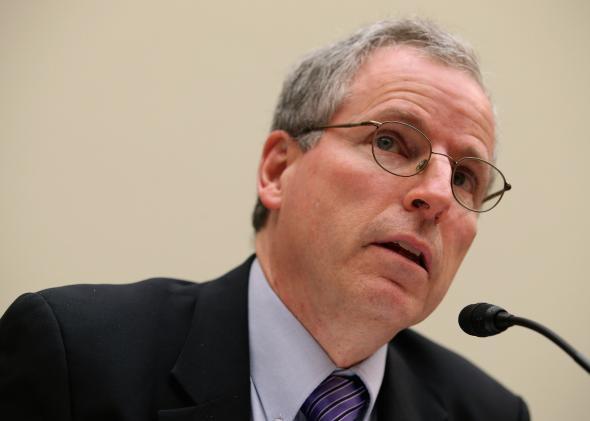Robert Ford, the veteran diplomat who stepped down as U.S. ambassador to Syria last month – he hadn’t actually been in the country since February, 2012, tells Christiane Amanpour that he can no longer defend U.S. policy toward the country:
“I was no longer in a position where I felt I could defend the American policy,” he said. “We have been unable to address either the root causes of the conflict in terms of the fighting on the ground and the balance on the ground, and we have a growing extremism threat.”…
At the beginning of Syria’s conflict, the U.S. State Department – including then-Secretary of State Hillary Clinton – pushed hard for America to provide robust support for the moderate opposition; that recommendation was not followed.
Ford said it is “now widely known that the State Department thought we needed to give much more help to the armed opposition in Syria.”
I’m not entirely convinced that robust support for the opposition could have turned the tide once Assad made it abundantly clear he had no plans to leave Damascus alive and was willing to see thousands of his people killed or displaced to keep power, but it’s true that it’s hard to point to any particular U.S. policy success in Syria.
The one candidate – the agreement to remove the Assad’s chemical stockpiles – has been somewhat undercut by evidence that the government has been using chlorine gas, a common chemical that would be virtually impossible for inspectors to catalog and remove. (An OPCW team investigating the chlorine attack came under fire last week.)
For a while, there was a coldhearted realpolitik case to be made – explained here by Dan Drezner – that the U.S. Syria strategy made grand strategic sense. Yes, there was an escalating and horrifying humanitarian catastrophe, but the U.S. commitment to the conflict has been minimal while Iran and Hezbollah on one side, and al-Qaida linked extremists on the other, have been pouring serious blood and treasure into fighting each other.
Even that grim notion becomes a harder case to make amid fears that the country is becoming a magnet for foreign fighters who could go on to carry out attacks outside the country. (The suspect just arrested in connection with last month’s attack on a Jewish museum in Brussels is a 29-year-old Frenchman believed to have traveled to Syria to fight with the hardline Islamist rebel group ISIS last year.)
“This is not rocket science. In a place where there is no government control, terrorist groups can infiltrate in and set up places where they can operate freely,” Ford said on CNN. “And we warned this would happen in Syria, and it has.”
It will be interesting to see how Ford is received in Washington if he becomes a consistent critic of administration policy. In 2010, Senate Republicans held up his confirmation as ambassador for months, questioning whether there should be a U.S. envoy to Syria at all. Ford was the first one to hold the job since the U.S. withdrew its ambassador in 2005 following the assassination of Lebanese Prime Minister Rafik Hariri. Obama eventually used a recess appointment to finally give him a job.
During his tenure as ambassador, Ford was an outspoken supporter of the Syrian opposition, often at great personal risk. As he became more openly critical of the Assad government, he eventually won over Capitol Hill.
